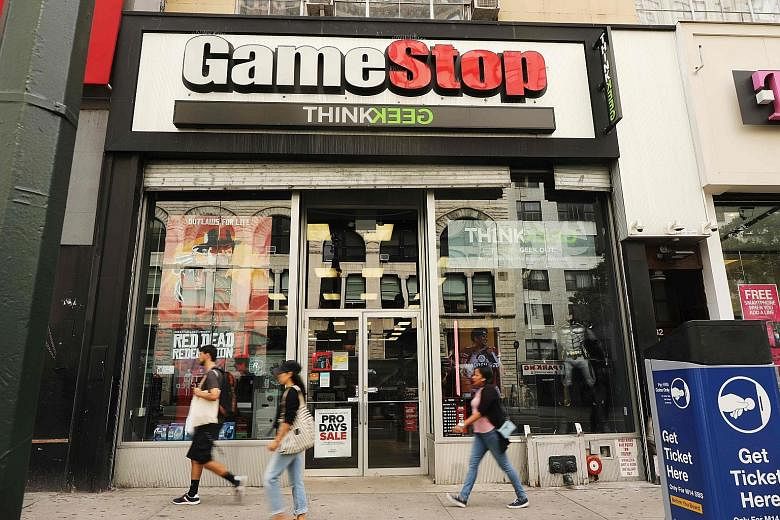LONDON • Rising concerns about stock bubbles on Wall Street are sparking fears of a pullback, highlighted by the wild ride for shares such as GameStop Corp.
A flood of money supply, ultra-low or zero interest rates and Covid-19 vaccine roll-outs have sparked a "buy everything" rally, helping world stocks add a whopping US$33 trillion (S$43.8 trillion) in value from their lows of last March.
Surges in share prices of some loss-making firms, red-hot public markets and amateur investors chasing stocks have drawn concern as the benchmark S&P 500 has gained more than 70 per cent since March.
Elevated retail participation has contributed to soaring prices.
"For retail traders, the warning signals on this... (are) if you are trading it, you are taking so much of an extra risk compared to normal activity. This is not normal activity," said TD Ameritrade chief market strategist JJ Kinahan.
As a prime example, investors pointed to shares of United States video game retailer GameStop, which, after rising about 250 per cent this year, more than doubled on Monday before paring back.
Traders said short-sellers were quickly buying back into the stock to cover potential losses while retail investors were piling in to benefit from the surge.
"Retail investors are a huge part of it," said Mr Christopher Murphy, co-head of derivatives strategy at Susquehanna Financial Group, referring to GameStop.
Early in Monday's trading session, users of several major retail trading platforms, including those of Charles Schwab and Robinhood, reported operational problems, according to outage monitoring website Downdetector.com.
The problems were the latest in a string of technical glitches among retail brokerages, which have faced a massive surge in volumes over the past year.
Overall, about 16.4 billion shares changed hands on Monday, compared with a month-to-date average of around 14.5 billion shares, according to Cboe Global Markets.
The euphoria is also evident in the small-cap Russell 2000 index, whose component companies with a negative operating profit outperformed the wider index by nearly 50 percentage points over the last year, a Reuters analysis of Refinitiv data showed.
"Pockets of the market have recently demonstrated investor behaviour consistent with bubble-like sentiment," Goldman Sachs analysts led by Mr David Kostin wrote.
The Goldman analysts noted that the outperformance of negative earners was still a far cry from the 140 percentage points clocked during the dot.com boom of 1999-2000 and more in line with that of the immediate aftermath of the 2008 financial crisis.
"You don't have to reach 1999-2000 levels of frothiness to have the market go down and to go down in a meaningful way," said Mr Matt Maley, chief market strategist at Miller Tabak.
For examples of these selective bubbles, investors point to electric vehicle-related stocks - Tesla is up eightfold and electric vehicle charging equipment maker Blink Charging by 2,000 per cent in the last 52 weeks, while an IPO index has surged 200 per cent since last March versus a mere 57 per cent for the benchmark S&P 500 index.
The US-listed shares of Canadian tech specialist Blackberry also surged on Monday, while the firm said it was not aware of a reason.
Deutsche Bank said in a research note that average call volumes over the past three months have hit a new peak with the bulk of the increase driven by small contract issues, reflecting retail buying.
Stocks with the highest call volume as a percentage of the market capitalisation were Fubotv, GameStop and Riot Blockchain, said Deutsche.
Ninety per cent of the respondents in a recent Deutsche Bank survey said they saw price bubbles in some parts of markets, with a majority expecting Tesla to halve in value by the year end.
Among the investors who have expressed concern is Mr Jeremy Grantham of money manager GMO, who said earlier this month that the long bull market since 2009 has finally matured into an "epic bubble".
Also, Baupost Group founder Seth Klarman told clients recently that risk "has simply vanished", according to the Financial Times.
However, not all the major banks see bubbles.
"Everyone's asking us about bubbles... even the frothiest equity indices still lag well behind performance during previous bubbles," said Citi equity strategist Robert Buckland.
The S&P trades at 22 times 12-month forward earnings, below the peak of 25 times seen ahead of the dot.com crisis.
Citing premiums over rock-bottom bond yields, Citi believes equity markets have a long way to go yet.
A possible rollback of easing by the US Federal Reserve is seen as a threat to markets.
"Equity bubbles are not delicate," Mr Buckland added. "They don't burst on the first hint of tightening from central banks."
REUTERS

